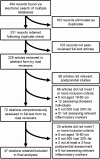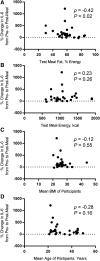Magnitude and Timing of the Postprandial Inflammatory Response to a High-Fat Meal in Healthy Adults: A Systematic Review
- PMID: 28298267
- PMCID: PMC5347112
- DOI: 10.3945/an.116.014431
Magnitude and Timing of the Postprandial Inflammatory Response to a High-Fat Meal in Healthy Adults: A Systematic Review
Abstract
Research findings over the past several decades have shown that inflammation is a prominent feature of many chronic diseases, with poor diet being one likely inflammatory stimulus. Specifically, a single high-fat meal (HFM) has been suggested to increase inflammation, although there is currently no consensus with regard to the specific changes in many of the proinflammatory markers that are frequently assessed after an HFM. The aim of this systematic review was to objectively describe the postprandial timing and magnitude of changes in 5 common inflammatory markers: interleukin (IL) 6, C-reactive protein (CRP), tumor necrosis factor (TNF) α, IL-1β, and IL-8. Ten relevant databases were searched, yielding 494 results, of which 47 articles met the pre-established inclusion criteria: 1) healthy men and women aged 18-60 y, 2) consuming a single HFM (≥30% fat, ≥500 kcal), and 3) assessing relevant inflammatory markers postmeal for ≥2 h. The only marker found to consistently change in the postprandial period was IL-6: on average, from a baseline of ∼1.4 pg/mL, it peaked at ∼2.9 pg/mL ∼6 h post-HFM (an average relative change of ∼100%). CRP, TNF-α, IL-1β, and IL-8 did not change significantly in 79% (23 of 29), 68% (19 of 28), 67% (2 of 3), and 75% (3 of 4) of included studies, respectively. We conclude that there is strong evidence that CRP and TNF-α are not responsive at the usual time scale observed in postprandial studies in healthy humans younger than age 60 y. However, future research should further investigate the role of IL-6 in the postprandial period, because it routinely increases even in healthy participants. We assert that the findings of this systematic review on markers of inflammation in the postprandial period will considerably aid in informing future research and advancing clinical knowledge.
Keywords: C-reactive protein; cytokine; interleukin; postmeal; tumor necrosis factor.
© 2017 American Society for Nutrition.
Conflict of interest statement
Author disclosures: SR Emerson, SP Kurti, CA Harms, MD Haub, T Melgarejo, C Logan, and SK Rosenkranz, no conflicts of interest.
Figures



References
-
- Heron M. Deaths: leading causes for 2010. Natl Vital Stat Rep 2013;62:1–96. - PubMed
-
- Hubert HB, Feinleib M, McNamara PM, Castelli WP. Obesity as an independent risk factor for cardiovascular disease: a 26-year follow-up of participants in the Framingham Heart Study. Circulation 1983;67:968–77. - PubMed
-
- Hu FB, Rimm EB, Stampfer MJ, Ascherio A, Spiegelman D, Willett WC. Prospective study of major dietary patterns and risk of coronary heart disease in men. Am J Clin Nutr 2000;72:912–21. - PubMed
-
- Hotamisligil GS. Inflammation and metabolic disorders. Nature 2006;444:860–7. - PubMed
Publication types
MeSH terms
Substances
LinkOut - more resources
Full Text Sources
Other Literature Sources
Medical
Molecular Biology Databases
Research Materials
Miscellaneous

